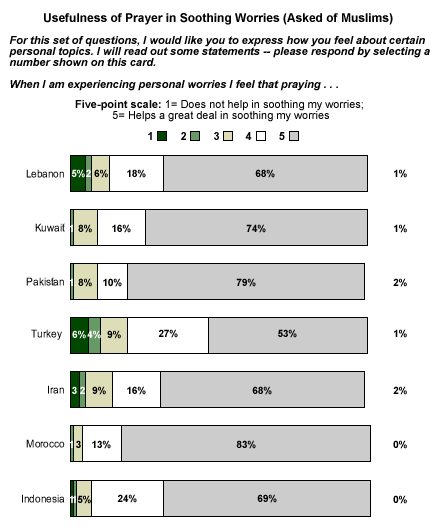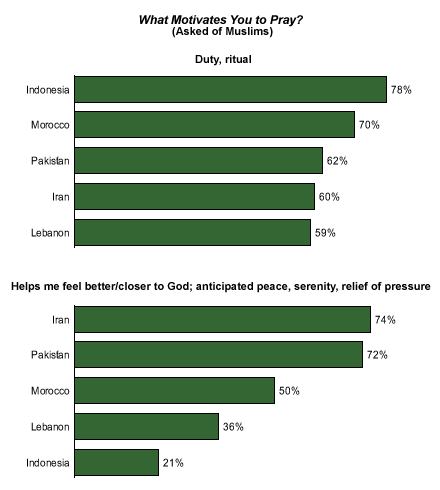"And they have been commanded no more than this: To worship Allah, offering Him sincere devotion, being true (in faith); to establish regular prayer; and to practice regular charity; and that is the Religion Right and Straight." -- Sura 98 (98:5), The Holy Quran
Every day, nearly all of the world's more than 1.2 billion Muslims turn toward Mecca in prayer. As prescribed by their religion, many regularly do so five times each day, from the early morning hours until evening.
For those not within the sound of a muezzin -- the voice that issues the call to prayer -- appropriate local prayer times are printed in virtually every Islamic newspaper. For travelers, specific prayer times for almost any location on the globe are available via the Internet (see, for example, "Al-Islam" in Related Sites). Hotel rooms in the Islamic world routinely include a small "Qibla" indicator, applied to the desk or nightstand, showing the direction of Mecca.
In Islam, regular prayer is a clear obligation. But is duty to a prescribed ritual the sole motivation behind the conscientious prayer among Muslims? Not according to the results of the 2002 Gallup Poll of the Islamic World.
An overwhelming majority of Muslims told Gallup that prayer helps to soothe their personal cares and worries. And when asked what motivates them personally to pray, Muslims commonly cited the effects of prayer -- in some cases, with even greater frequency than references to responsibility or duty.
Perceived Usefulness of Prayer in Soothing Cares and Worries
In each of the seven countries in which this question was asked, a majority of Muslims said they feel that prayer helps a great deal in soothing their personal worries. In six of these countries (Morocco: 83%, Pakistan: 79%, Kuwait: 74%, Indonesia: 69%, Lebanon: 68%, Iran: 68%), more than two-thirds gave this response.
Only in Turkey did as many as 6% of Muslims tell Gallup they feel that prayer does not help ease their personal worries. That said, it is also worth noting that 53% of Turks said that prayer helps them a great deal in easing personal worries.

Motivations for Praying
In five of these same countries -- Indonesia, Iran, Pakistan, Lebanon and Morocco -- Gallup also asked the open-ended question, "What motivates you to pray?"
In each case, roughly three-fifths or more refer to either duty or ritual as their personal reason for praying (Indonesia: 78%, Morocco: 70%, Pakistan: 62%, Iran: 60%, Lebanon: 59%). But the reported motivation for prayer does not end there.
In Iran, Pakistan and Morocco, anywhere from half to two-thirds of the Muslims interviewed also said they pray either because it makes them feel better and closer to God, or because of an anticipated sense of peace, serenity or relief of pressure (Iran: 74%, Pakistan: 72%, Morocco (50%). Even in Lebanon (36%) and Indonesia (21%), significant numbers of Muslims said that they are motivated to pray by the immediate effects that they experience when doing so.

Key Points
Muslims certainly feel a moral duty and obligation to pray. But like those ascribing to other religions around the world, Muslims also use to prayer to help themselves feel comforted and at peace, and to provide answers to their problems.
